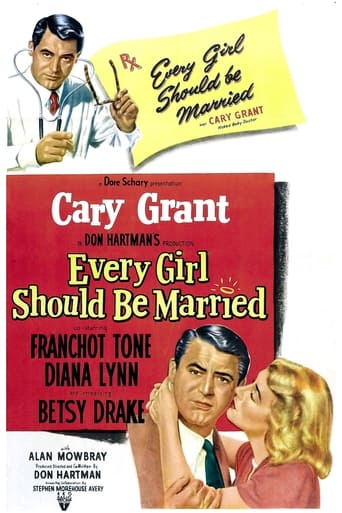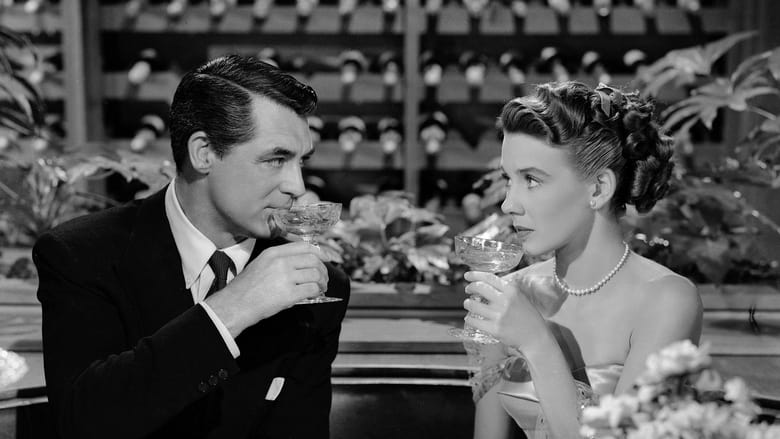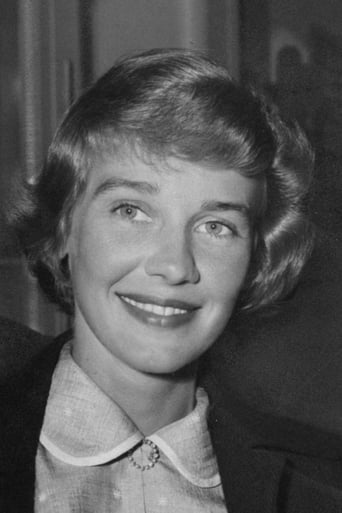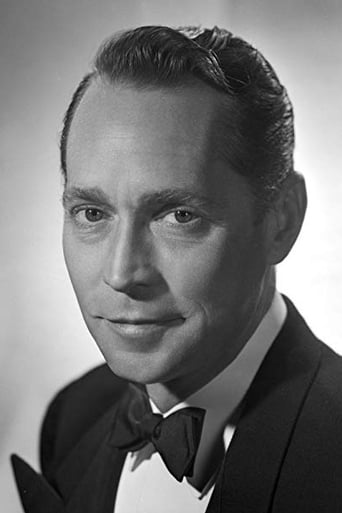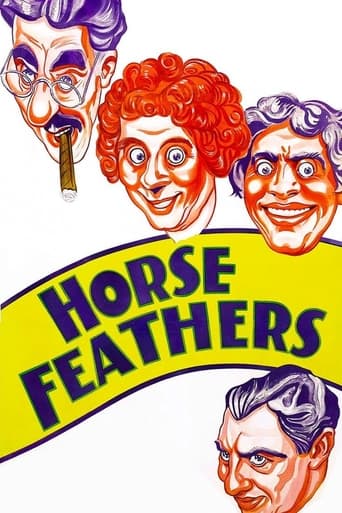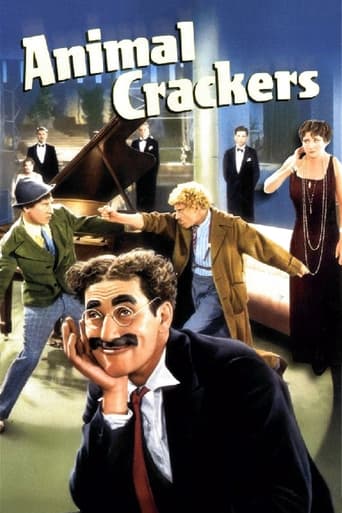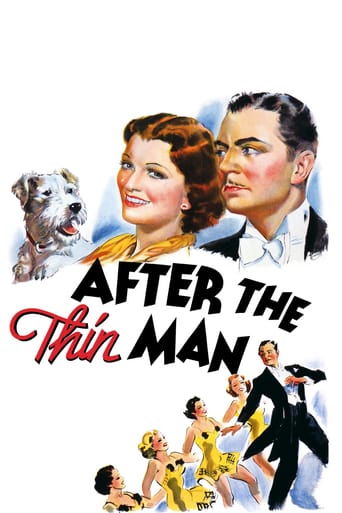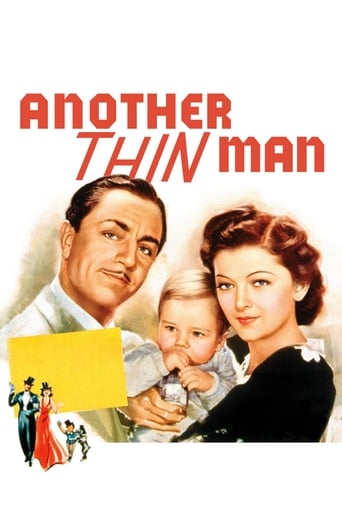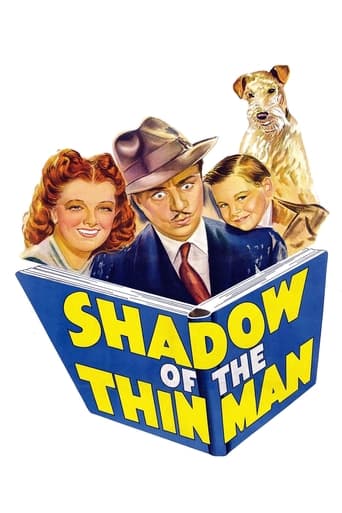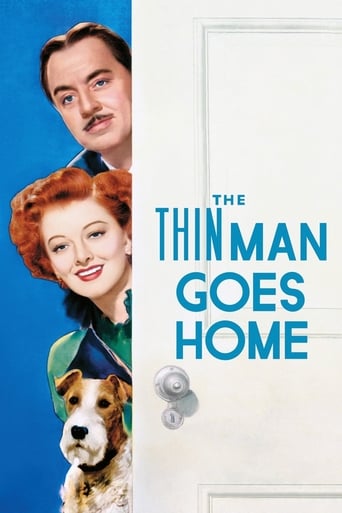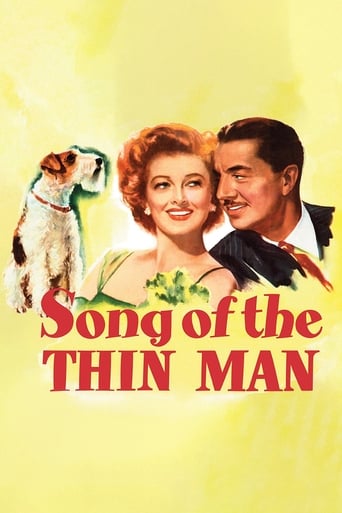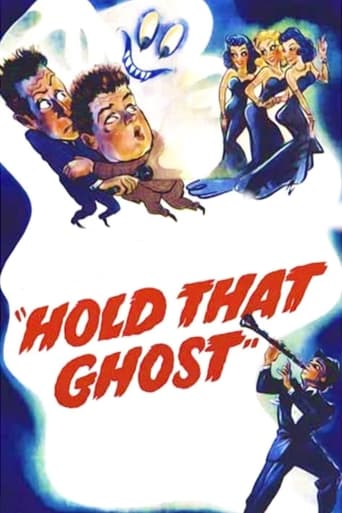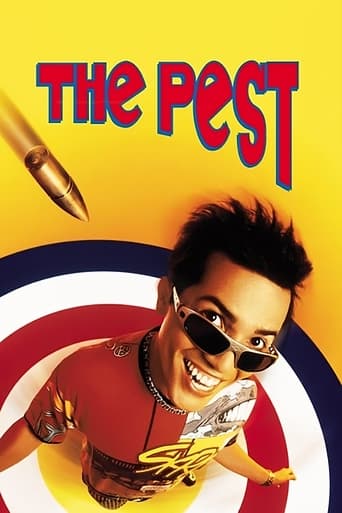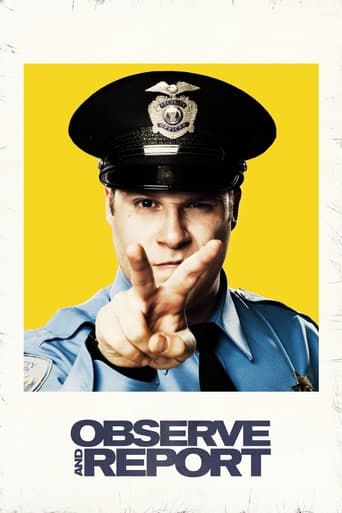Every Girl Should Be Married (1948)

Anabel Sims is determined to find the perfect husband. She thinks she's found her man in Madison Brown, a handsome pediatrician. She then prepares an elaborate scheme to trap him into marriage
Watch Trailer
Cast


Similar titles
Reviews
Like fingernails scratching down a blackboard, Betsy Drake's annoying voice dominates this dreary offering from RKO. While nominally a Cary Grant film, Grant transparently takes second place behind the true star of the film, Betsy Drake. And what a painfully miserable choice she was. She is unable to open her mouth without engaging in a sanctimonious lecture about marriage and her plans to trap Grant, and barely two minutes ever go by in the film without her doing so. She is as unappealing an actress as has ever been my misfortune to waste time watching. Her endless speeches are unbearable, and I, who am able to suspend disbelief at the most outrageous plots, will go to my grave not accepting for a second that Cary Grant could ever have an interest at all in the most self-righteous and unattractive Betsy Drake.If only Grant had been given more to do in this film.But if you do choose to watch "Every Girl Should Be Married", there are a few interesting moments worth looking out for. The best comes when Cary Grant, going off on one of his diatribes against marriage in general and Betsy Drake in particular, actually does a very funny impersonation of Drake, complete with high pitched voice and female mannerisms. A quite enjoyable moment in what otherwise must have been a most boring assignment for Grant.One other interesting moment occurs when Grant is sitting beside Drake in her home, and the telephone rings for a second time. The receiver is apparently placed backwards on the telephone base, so that when Drake reaches for it, she ends up picking up the receiver sort of inside-out, and it is rather awkward; however, her improvisation goes smoothly enough, and was obviously kept in the film.Now you all remember the great telephone scene in "It's a Wonderful Life"; Jimmy Stewart and Donna Reed are sharing the receiver as they speak to their old friend Sam. Because they have yet to openly declare their love for each other, the tension inherent in their being in such close proximity to each other is spectacular. Well, here in "Every Girl Should Be Married", there is a similar moment in the same scene as described above; as Drake and Grant are sitting next to each other, they pass the telephone receiver back and forth as it rings, and casually brush and touch each other's arms as they share a look at a baby magazine; here was some potential for some interesting tension. Unfortunately, like the entire rest of the movie, the potential is not even remotely realized. Just another small failure, though this is just a cog on a giant wheel of failure.Even the endless appearance of the great old song "Sailing" (recorded most memorably by Bobby Darin) becomes grating after a while.On the other hand, quite pleasing is the surprising un-credited appearance of genial Eddie Albert in the long closing scene. A great job by Albert, but sadly too little too late.Is this film awful? Maybe not awful, but at best, unbearable.
It's just another day at work for shop girls Betsy Drake and Diana Lynn, who over lunch decide that Every Girl Should Be Married. Especially after Betsy sees just the man she ought to be married to in the person of Cary Grant. Ironically enough that's exactly whom she did marry in real life.But back to this film, Betsy stalks and pursues him with the charm of an innocent child and as relentless as a jungle cat. These kind of films are kind of hard to pull off because if not done right you do come over like a stalker. Still Drake is successful enough to make you believe in her innocence.In fact for a film that stars Cary Grant and Franchot Tone, the real lead in the film is Betsy Drake. Grant does get in a few good moments however, the best being when he in his capacity as a noted pediatrician, Drake takes his audience away with her questions about his bachelorhood. Grant's reaction shots are priceless.Twelve years earlier Grant and Tone co-starred with Jean Harlow in Suzy with the billing completely reversed. It was at MGM and Tone's studio and Grant wasn't as big a name then. In those years their careers had completely reversed and Tone was now usually a second lead, but in this he was his usual rich playboy, the parts now he'd become used to being typecast in.In those same years Grant left his original studio at Paramount and his career pattern had him going back and forth from RKO and Columbia. Every Girl Should Be Married was Cary Grant's final film at RKO, a studio where he'd done such things as Bringing Up Baby, The Awful Truth, Mr Favorite Wife, and Mr. Lucky to name a few. Every Girl Should Be Married ain't quite up to the standards of these classics, but it has its moments.
One-note comedy that probably sets modern day feminists' teeth on edge. Department store clerk Betsy Drake is in love with the idea of babies and marriage, pinning her hopes on women's magazines until she spies super-bait in the form of sleek bachelor Cary Grant. The rest of the film plods from one ploy to the next as the relentless Drake pursues her quarry. I guess the word "perky" just about sum's up Drake's approach to the role. She does have a charming smile, but after 20 minutes of memorizing her dentures, I began to overdose. Grant's role is basically secondary and minus his usual flair. There is one scene, however, that almost salvages this slender exercise. Drake queries the hapless Grant following his lecture to a roomful of respectable ladies. Here her perky manner has an unforced freshness that is really quite remarkable, and had the production not rubbed our noses in that upbeat grin for 90 minutes, the film might have amounted to more than a girls' camp day-dream, circa 1948.
This is a cute and intelligent comedy about a bright attractive woman (Betsy Drake) who is determined to select and marry the right guy, namely Dr. Brown played by Cary Grant. Well, determined she is. Her efforts, the way they backfire, her perseverance and her eventual success all contribute to convince us that "Every Girl should be Married". I highly recommend this movie for couples looking for a romantic light comedy to escape the burden and pain of everyday life. The real life romance between Drake and Grant shows in the realism of the tenderness and attraction of Miss Sims for Dr Brown. This is a top movie with famous cast, solid script and excellent direction that will not lead you wrong.I was disappointed by poor reviews given by several IMDb readers especially in light that the very same movie received excellent reviews upon its release in 1948 so I would like to explain my positive assessment of this movie and help newcomers form an opinion for themselves. When one evaluates a movie from the past or from a different country, it is important to take into account and consider the era (time frame) the movie was created in, the context of the story (political situation, censorship if any, etc ) and the cultural influence due to location (country of origin) or tradition (social context at the time). The script: The movie was filmed before I was born but by looking at the reviews of the times, I see that the script writers got a nomination for best written American Comedy. This indicates that they created a "little gem" as judged by their peers (Writers Guild of America) who included some of the best American writers of the century. The cast: Looking at the main actors, Cary Grant was already established as an actor in 1948 and was not struggling to find work. He was the "eternal gentleman-like bachelor" and worked mostly in "high comedies with polished words". He actually found the scenario promising and recommended Betsy Drake as his supporting actress. Betsy Drake was a classic-trained actress (British Theater) who was first spotted (in the US) by none other than David Selznick, one Hollywood's top iconic producers of the Golden Era (remember "Gone with the Wind"?). This was her first production in the US and may explain "some" stiffness in front of the critical eye of the cameras. She devoted part of her life supporting her older husband, none other than Mr. Grant himself and became a writer. So based on these two references, she must have had something special. The assertive Miss Sims: Society-wise, 1948 was a transition era for Americans. In these immediate post-war years, returning Veterans and American men in general were shocked by the newfound freedom and autonomy of American women who had to either support the war effort or keep the fort while they were away. The notion of independent and self-reliant women was new if not strange to them, let alone a woman who is determined to go after what SHE wants and not what men want for her. This movie depicted this "coming of age" in a humoristic way. Do not forget also that all Hollywood productions were subject to the strict Production (Hays) Code which dictated that the ultimate role of women was to become wives/mothers over anything else. In other words, the ritual "burps" and "farts" common place in modern American comedies were neither funny nor acceptable. The reaction at the box-office: Very good since "Every Girl should be Married" was RKO's biggest hit of that year and received positive strokes from the major publications from that period. Enjoy! Lancelot

